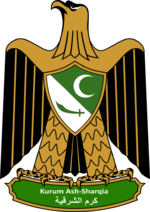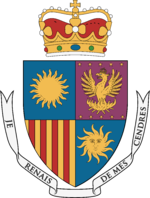Treaty between Kurum Ash-Sharqia and Nouvelle Alexandrie
The Treaty of friendship and cooperation between the Sultanate of Kurum Ash-Sharqia and the Federation of Nouvelle Alexandrie was signed 1722 AN in Vrijplaats, Kurum Ash-Sharqia by Maximinus Kerularios, Secretary of State of Nouvelle Alexandrie and Hayat Markenburger, Grand Vizier of Kurum Ash-Sharqia. Crown Prince Uturuncu was also in attendance at the request of his father, King Sinchi Roca I, who wanted his son to get experience in foreign affairs and receive the honor Salah Ad-Din I was granting him.
At the signing ceremony, awards were exchanged between the heads-of-state of the contracting parties:
- To King Sinchi Roca I: the Grand Cordon of the Order of As-Saif. The Order was accepted on behalf of the King by Crown Prince Uturuncu
- To Sultan Salah Ad-Din I: the Grand Cordon of the Grand Order of the Federation of Nouvelle Alexandrie
Text
TREATY OF FRIENDSHIP AND COOPERATIONBETWEEN
THE SULTANATE OF KURUM ASH-SHARQIA
AND
THE FEDERATION OF NOUVELLE ALEXANDRIE
His Majesty, Salah Ad-Din I, the Sultan of Kurum Ash-Sharqiaand
His Majesty, Sinchi Roca I, the King of Nouvelle Alexandrie
desire for a diplomatic relationship and good understanding between them, underpinning further friendship between their respective countries, have agreed to the following articles of agreement:Article I – Peace and friendship
There shall be a firm and perpetual state of peace and friendly relations between His Majesty, Sultan of Kurum Ash-Sharqia and His Majesty, the King of Nouvelle Alexandrie, between Their Heirs or Successors, and between the Sultanate of Kurum Ash-Sharqia and the Federation of Nouvelle Alexandrie, in this treaty the High Contracting Parties, and between their Citizens, without discrimination.Article II - Sovereignty and territorial integrity
Each High Contracting Party shall respect the independence, sovereignty and territorial integrity of the other party. The High Contracting Parties shall continue to develop and consolidate the relations of sincere friendship, good neighbourliness and comprehensive cooperation existing between them on the basis of the aforesaid principles as well as those of equality and mutual benefit.The High Contracting Parties shall not engage in or sponsor any covert or overt military activity against the peoples or government institutions of the other.
Article III - Airspace
The High Contracting Parties recognize that every Party has complete and exclusive sovereignty over the airspace above its territory.The High Contracting Parties grant the right to all civil aircraft of the other Contracting Party to overfly its territory. When the source and destination of such a civil flight are outside the jurisdiction of the overflown High Contracting Party and no intermediate landing upon the territory of the overflown High Contracting Party is made, it shall be considered to fall outside the remit of customs or immigration regulations and wholly outside the jurisdiction of any third parties, without prejudice to the exclusive right of the overflown High Contracting Party to approve or deny such overflight as it sees fit.
The High Contracting Parties can set up a prohibited airspace, where an overflight is strictly prohibited. They agree to inform each other via appropriate diplomatic channels.
Article IV – Diplomatic mission
The High Contracting Parties will maintain regular contacts with each other on major international problems affecting the interests of both of their countries and governments by means of meetings, and exchanges of views between their leading statesmen, visits by official delegations and special envoys of the governments, and through diplomatic channels.The High Contracting Parties will make an embassy available for each other. For the embassy, associated grounds, associated vehicles, leading statesmen, visits by official delegations, special envoys of the governments and ambassadors, diplomatic immunity applies.
Each High Contracting Party recognizes and respects the procedures of acceptance by the ambassador, by handing over a letter of credence, which is addressed from one head of state to the other.
Article V - Recognition of bureaucracy
Each High Contracting Party gives to the other full faith and credit to all public acts, records, contracts and judicial proceedings in the field of civil law, including records and documents on marriage, property, titles, death and inheritance, in as much as any act, record, document, contract, proceeding is done according to the law.Article VI - Interpretation
Any difference of interpretation of any Article or Articles of this Treaty which may arise between the High Contracting Parties will be settled bilaterally by peaceful means in a spirit of mutual respect and understanding.Article VII - Ratification and amendmending
This Treaty enters into force upon its signature and ratification by Both High Contracting Parties in accordance with their respective domestic procedures.This Treaty may only be amended upon the concurrence of both High Contracting Parties. Any contrary action or measure shall be null and void.
Article VIII - Repeal
Each High Contracting Party may repeal this treaty on the condition of a notice of one Norton year.
Signed on 4 VI 1722 AN at Vrijplaats:For the Sultanate of Kurum Ash-Sharqia:
Hayat Markenburger
Grand Vizier of Kurum Ash-SharqiaFor the Federation of Nouvelle Alexandrie:
Maximinus Kerularios
Secretary of State of Nouvelle AlexandriePrince Uturuncu
Crown Prince of Nouvelle Alexandrie, Prince of Rimarima

